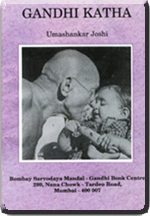
P.O. SEVAGRAM, DIST.WARDHA 442102, MS, INDIA. Phone: 91-7152-284753
FOUNDED BY MAHATMA GANDHI IN 1936

GANDHI KATHA
Written by :Umashankar Joshi
Translated by : Divya Joshi
Table of Contents
- The Miracle of Ramnama
- Equal Care For Everybody
- Motherly Love
- Oneness With Countrymen
- Universe As Family
- Playful Bapu
- The Power of Practice
- Mohan Would Not Steal
- A Lesson for School Children
- The Sportsmanship
- A Lesson Learnt From Mistake
- Its For All!
- Small Thing - Big Lesson
- Saintly Mother
- Unusual Examiner
- The First Satyagrahi
- Nothing is Unimportant
- A Confession
- The Magic of Love
- Always With The Poor
- Practical Approach
- Winning in A Loss
- The Art of Sleeping
- Punctual Bapu
- The First Lesson is Cleanliness
- Smart Kittens
- Ahimsa or Cleanliness ?
- Story Time in Jail
- Bapu - The Host
- The Making of Mahatma
- Ba - The First Satyagrahi
- Heartfelt Sympathy
- Introspective Bapu
- Unflinching Faith
- Firm on Commitment
- An Ordeal for Carelessness
- Self-Suffering
- Self Imposed Discipline
- How I Became Mahatma
- Adans Affection
- A Lesson of Cleanliness
- The Economy at Work
- The Real Friend
- True Ahimsa
- A Lesson for Detachment
- Invaluable Donation
- Anasakti Yoga
- Thinking For Others
- Great Flexibility
- Deep Compassion
- Bapu - The Strategist
- A Novel Leader
- He is Mine !
- Always On Time !
- The Wit of Bapu
- No Security Except God
- No Expensive Fruits For Me !
- The Great Statesman
- Gift For An Opponent
- Be Immortal!
About This Book
Written by :Umashankar Joshi
Translated by : Divya Joshi
First Edition : 3,000 copies, August 2010
Total : 54,000 copies
I.S.B.N :81-7229-095-0
Published by :Bombay Sarvodaya Mandal - Gandhi Book Centre
299 Nana Chowk,
Tardeo Road,
Mumbai 400 007,
MS, India
Navajivan Mudranalaya,
Ahmedabad - 380 014,
India.
Printed by :Jitendra T. Desai
Navajivan Mudranalaya,
Ahemadabad-380014 (INDIA)
© Swati Umashankar Joshi
Download
Chapter-20: Always With The Poor
August 15,1947. It was the day of India’s independence. The British power, that ruled over the seven seas and whose sun never set, departed from India peacefully. The Indians took the reign of power in own hands.
Where was the Father of the Nation on this historic day? What was he doing on the day of celebration, the one who perhaps contributed the most to bring about this day? The independence was achieved, but there was still much work to be done. There was no communal harmony. He was the father of the nation and so he stood by his countrymen in their misery.
Communal riots had broken out in Calcutta. So, he wanted to be there, amongst the people. He went and stood right there, in the middle of the communal fire.
Where did he sleep on the night of independence? Belia Ghat was one of the poorest and very dangerous areas of Calcutta. Being a helper and a ‘Beli’ (saver) of the poor, Bapu decided to stay there in a small house.
Bapu’s bed was made on a wooden plank (pat) and all others slept on the floor, spreading whatever they found handy.
When Bapu noticed this, he said, “All of you are sleeping on the floor and I sleep on this `Chatra Palang’ (royal bed). How is it possible? That is not proper; I will also sleep on the floor.”
It was as though the bed was prickling Bapu and the bed was like a “chhatra palang” to him! He was satisfied only when he slept on the floor with all.
When the Indians were celebrating freedom in Delhi, the capital of India, and throughout the country, Bapu, the father of the nation, sat in a hut like the poorest of the poor people. Through his act and his example, he showed what remained to be done.